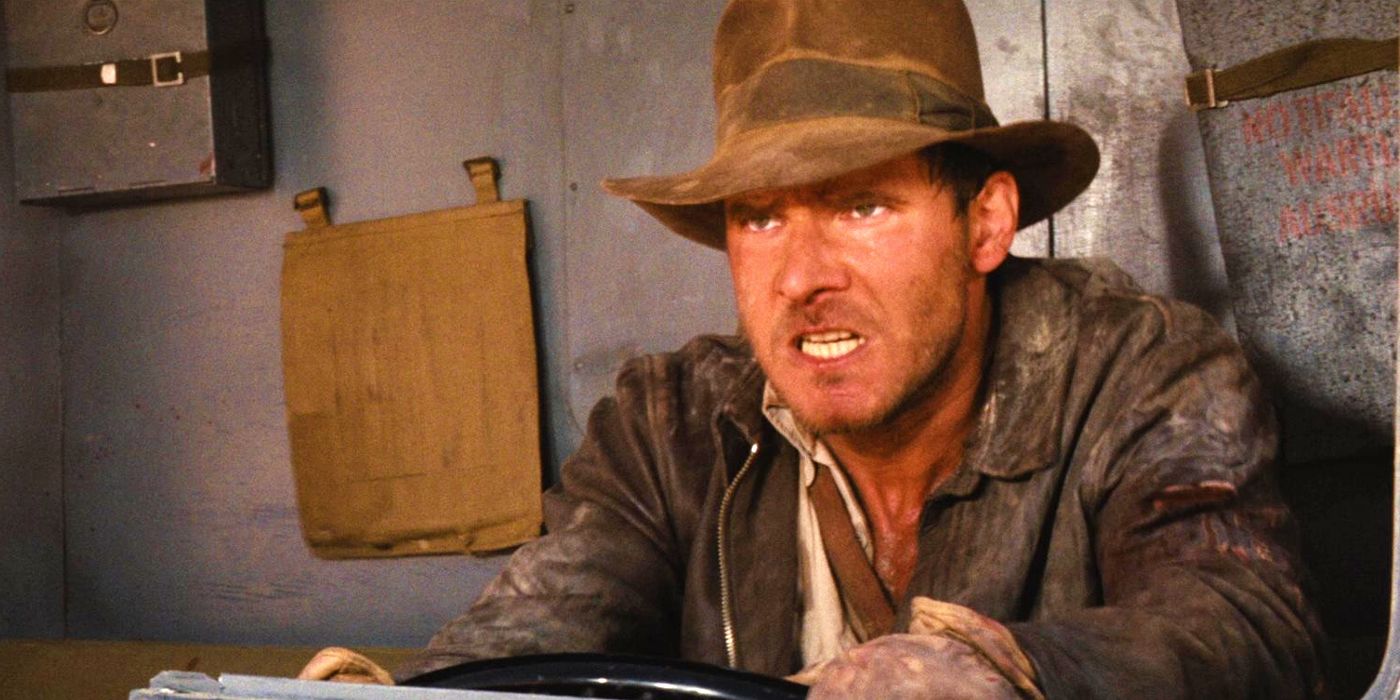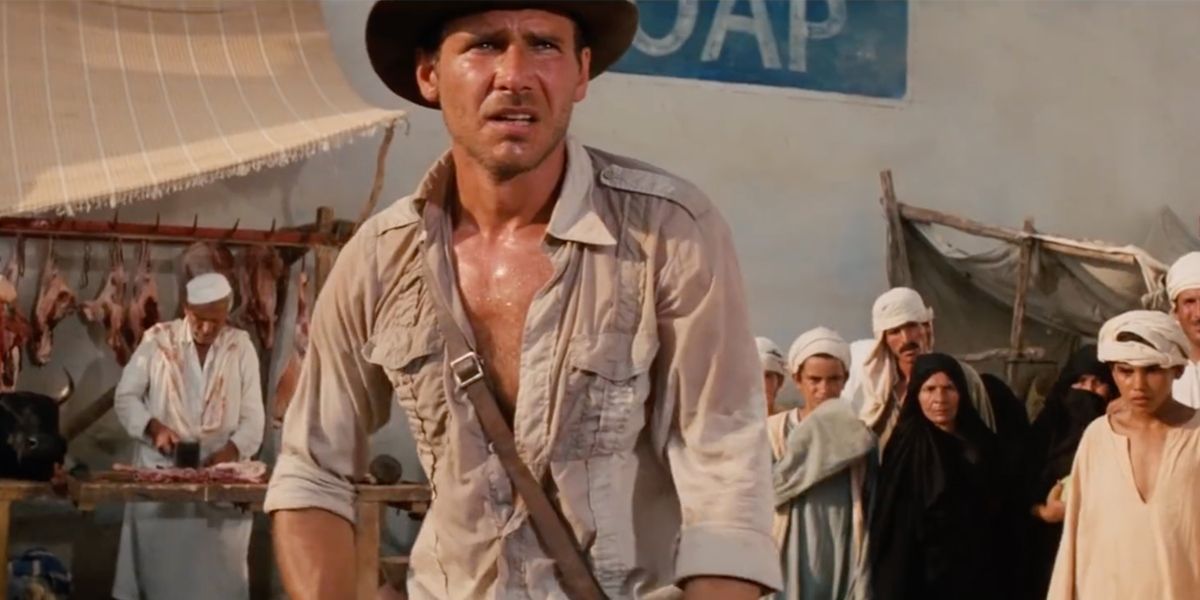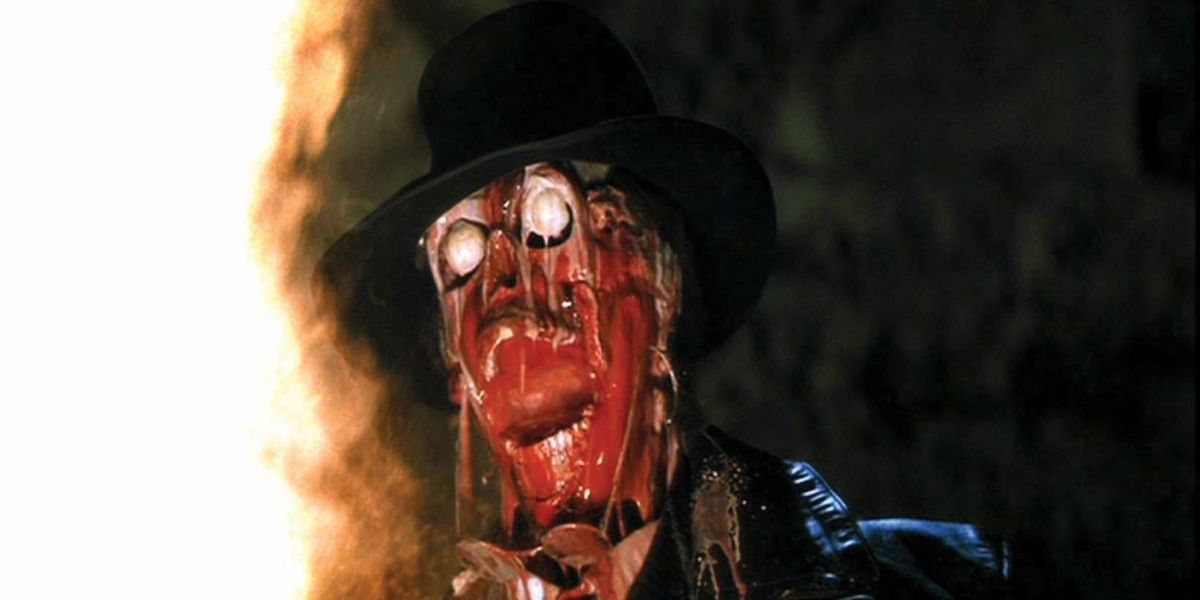Harrison Ford Went to Find the Art of the Covenants
Among the many atrocities committed against popular culture by The Large Blindside Theory , there exists only i that equals the sheer, scenic obnoxiousness of coming across a Young Sheldon poster without warning. I speak, of course, of the style the bear witness brought to calorie-free and legitimized a piece of geek criticism once reserved for the darkest, about abrasive corner of your local video store: The "Indiana Jones Doesn't Matter In His Own Motion picture" theory. Folks, I hate information technology, and on Raiders of the Lost Ark 's 40th anniversary, information technology's finally fourth dimension to put the dang thing in the dirt. Not necessarily because it's "wrong" or "correct", merely because it fundamentally doesn't work as criticism and ignores what makes cinematic storytelling powerful in the kickoff place. It does non, to be clear, vest in a museum, unless "a museum" is what you phone call the dumpster out back.
As explained in the 2013 episode "The Raiders of Minimization," the idea posits that Indiana Jones (Harrison Ford) has no upshot on the result of Steven Spielberg's Raiders of the Lost Ark ; had Indy just stayed at dwelling house, the Nazis withal would have opened up the Ark of the Covenant and melted like a parcel of aggressively racist Peeps put in a microwave. TBBT didn't invent the idea—it'south probably been circulating since the first uber-nerd left a matinee in 1981—but information technology did turn it into A Thing, sparking headlines like "How The Big Blindside Theory Ruined Indiana Jones For Everyone" and "Has The Large Bang Theory Ruined Indiana Jones Forever?" and ensuring you'd have to hear almost it every time you see that cousin whose ten,000-case Blu-ray collection is but unlike releases of the same iii Michael Mann films. It'southward get one of the most common "did you lot ever detect this?" topics in cinema history, rivaling Daniel LaRusso'southward illegal crane kick and that Stormtrooper who bonks his head on a doorframe.
But Indiana Jones has no effect on the result of Raiders of the Lost Ark because that's not the story of Raiders of the Lost Ark. That would be Indy'south emotional arc, crystal clear from the moment we meet him. That opening trek through the trap-filled temple is masterful stage-setting, just its undercurrent is what it somewhen tells us about Indiana Jones. "I had it in my hand," he tells Marcus Brody (Denholm Elliott), ignoring the several dozens times he near died while also tying the historic significance of the notice to his own personal glory. Ford's charms e'er smoothen the graphic symbol's edges, but my guy opens this film as the lexicon definition of cocksure. No human in history has always been more certain of the cock. Ford pulls off a wonderful transition between Indy explaining the Ark's mythology to two Regular army Intelligence agents—scholarly and buttoned-upwards, selling the awe of the artifact—and the very next scene. My guy is in a damn bathrobe, itching for Brody to say he's got another take chances to brand archaeological history. He straight-upwardly laughs off the "taking on a well-funded battalion of Nazis" attribute of the mission because he packed the good revolver. More importantly, he scoffs at the purported power of the Ark. "You know I don't believe in magic, a lot of superstitious hocus-pocus," he tells Brody. "I'thou going after a find of incredible historical significance, you're talking about the boogie man."

The unabridged residual of the film is nature, mankind, and God himself saying "Indy don't exercise this" and Indy doing information technology anyway. "If it is at that place at Tanis, then it is something that man was not meant to disturb. Death has always surrounded it," Sallah (John Rhys-Davies) tells Jones, seconds earlier a Nazi monkey eats a poisoned appointment, universally recognized equally A Bad Sign. Uncharacteristic lightning crackles over Cairo every bit Indy gets punched, shot at, walloped, and otherwise tossed around, but the shining idea of the Ark at the end of the road keeps him persevering well across what a body should handle. It's incredibly endearing—information technology's why nosotros love Indiana Jones!—only it's also one pace to the left of madness. Belloq (Paul Freeman) tells him as much, in a classic we-are-not-so-different-you-and-I speech. Indiana Jones is handsome, charming, and comes with the tremendous benefit of existence played by Harrison Ford, but he'southward still a human wrecking brawl who comes to other counties and cultures and causes an accented ruckus under the guise of archeology. Boiled down, he's one desperate decision away from becoming a villain.
"Archeology is our organized religion, yet we accept fallen from the pure faith," Belloq says. "Our methods have not differed as much as you pretend. I am but a shadowy reflection of you. Information technology would take only a nudge to make you similar me. To button you out of the light."

That is what makes the climactic Ark-opening scene so powerful. In that location's no real indication of why Indy tells Marion (Karen Allen) to close her eyes because it's an act of pure faith; it's a man who didn't believe in "superstitious hocus-pocus" recognizing he's in the presence of something tremendously across himself. More that, information technology's something he tin't merely bullrush his style through. In that moment, Spielberg and George Lucas' vision of a modernized 1920s risk serial is solidified, because information technology's the blazon of vulnerable character development never afforded to the he-man heroes of old, the ones who merely kicked ass and rescued damsels. Instead, Indiana Jones closes his eyes, and Belloq, the man who stubbornly stuck to his ways, gets his face diddled off like a faulty Roman candle.
To be articulate, this all also 100% does take an effect on the moving-picture show's ending, it's but way more cynical an ending than nostalgia might allow yous to remember. (As Spielberg's career progressed information technology became more and more obvious this was no accident.) Sure, without Indy, the Nazis might have brought the Ark back dwelling and diddled the Tertiary Reich to pieces, and that'due south pretty fun to recollect nigh. Only Indy (and, by extension, America) did intervene, and now the about powerful antiquity on the face of the World—ane that didn't vest to the U.S. in the kickoff place—sits useless in a warehouse, America deciding to squash a culture instead of report it. Information technology's the sketchy, invasive undercurrent of the Indiana Jones grapheme writ large, but as Indy walks away with Marion as the credits coil, he's a part of information technology no longer.*

This is all to say, "Indiana Jones Doesn't Matter" isn't annoying because information technology's "wrong"—Indiana Jones is non directly responsible for a Nazi regiment being struck down by the wrath of God, this is true—but because it's emblematic of the type of I-must-be-smarter-than-the-movie criticism that'southward ruining the way we talk most movies. Information technology'due south almost designed to miss the point. Information technology'southward the film-every bit-riddle mindset that get-go formed aslope the birth of the internet, simply really crystalized into something insidious somewhere between the mid-point of Lost and the exact moment Inception cutting to black. "Indiana Jones Doesn't Thing" is the personification of the idea films and idiot box shows are something to be solved instead of felt; that stories are static objects made of ones-and-zeroes and to remove the flawed piece of data sends the whole thing crumbling. (Thus making you The Cyberspace'due south Smartest Boi that solar day.) But movies are, in Roger Ebert'south words, "machines that generate empathy"; whether information technology'south a tranquillity graphic symbol report or a globe-trotting chance, the joy comes from living another life for a few hours. That is the result of character, not plot, and Indiana Jones is the blazon of character whose arc is supposed to have holes.
(*"Oho!," you might be exclaiming, "but what nigh Temple of Doom, the prequel that establishes Indy has experienced magic, or The Last Crusade, the sequel that sees Indy galavanting against the Nazis once again!" The simple answer is that Steven Spielberg and Co. didn't know there'd be more than movies when they made Raiders in 1981. That is how filmmaking and as well the passage of time works. The even simpler respond is please go back and read the paragraph immediately preceding this 1.)
About The Author
Source: https://collider.com/indiana-jones-doesnt-matter-theory-is-bad/

0 Response to "Harrison Ford Went to Find the Art of the Covenants"
Post a Comment